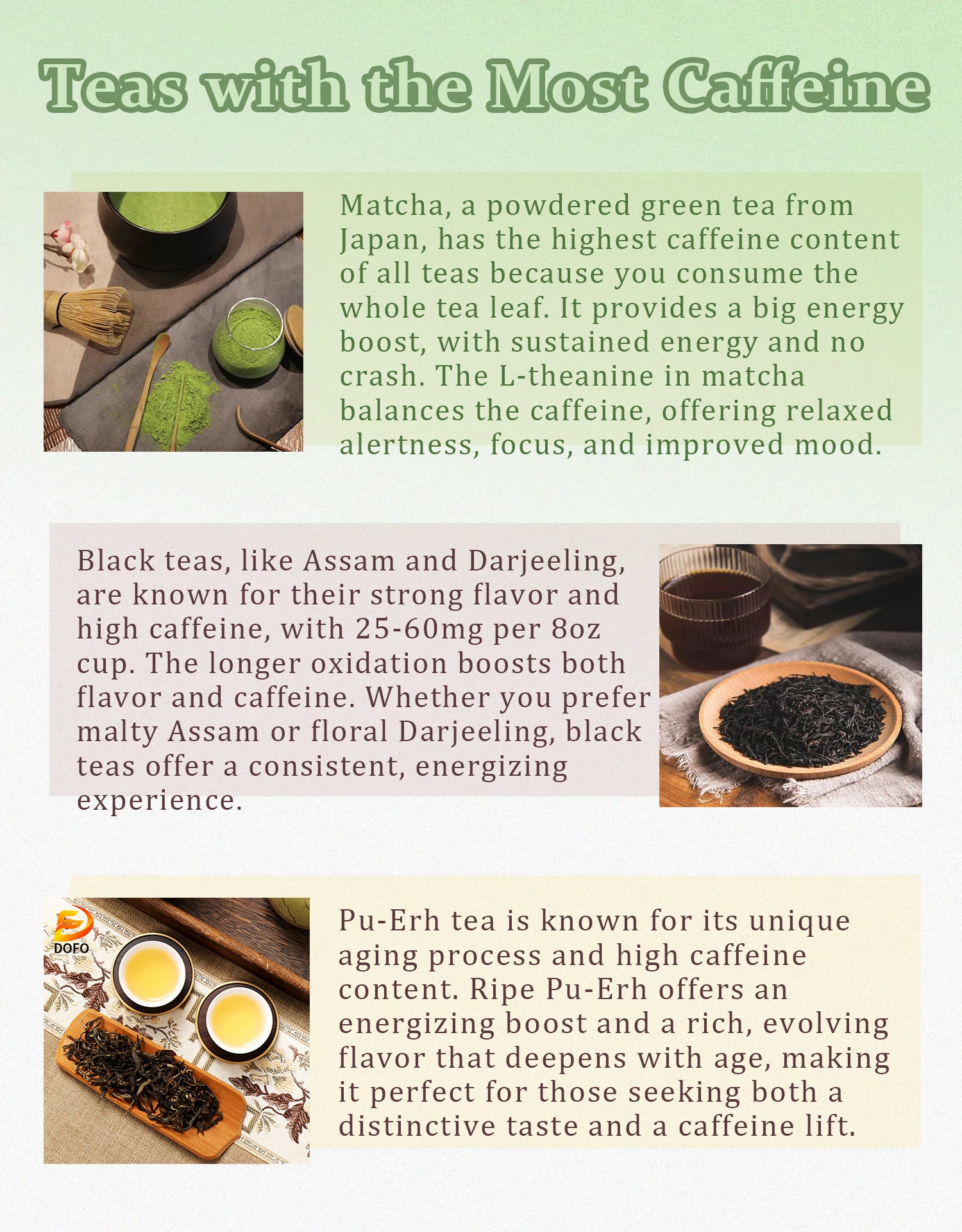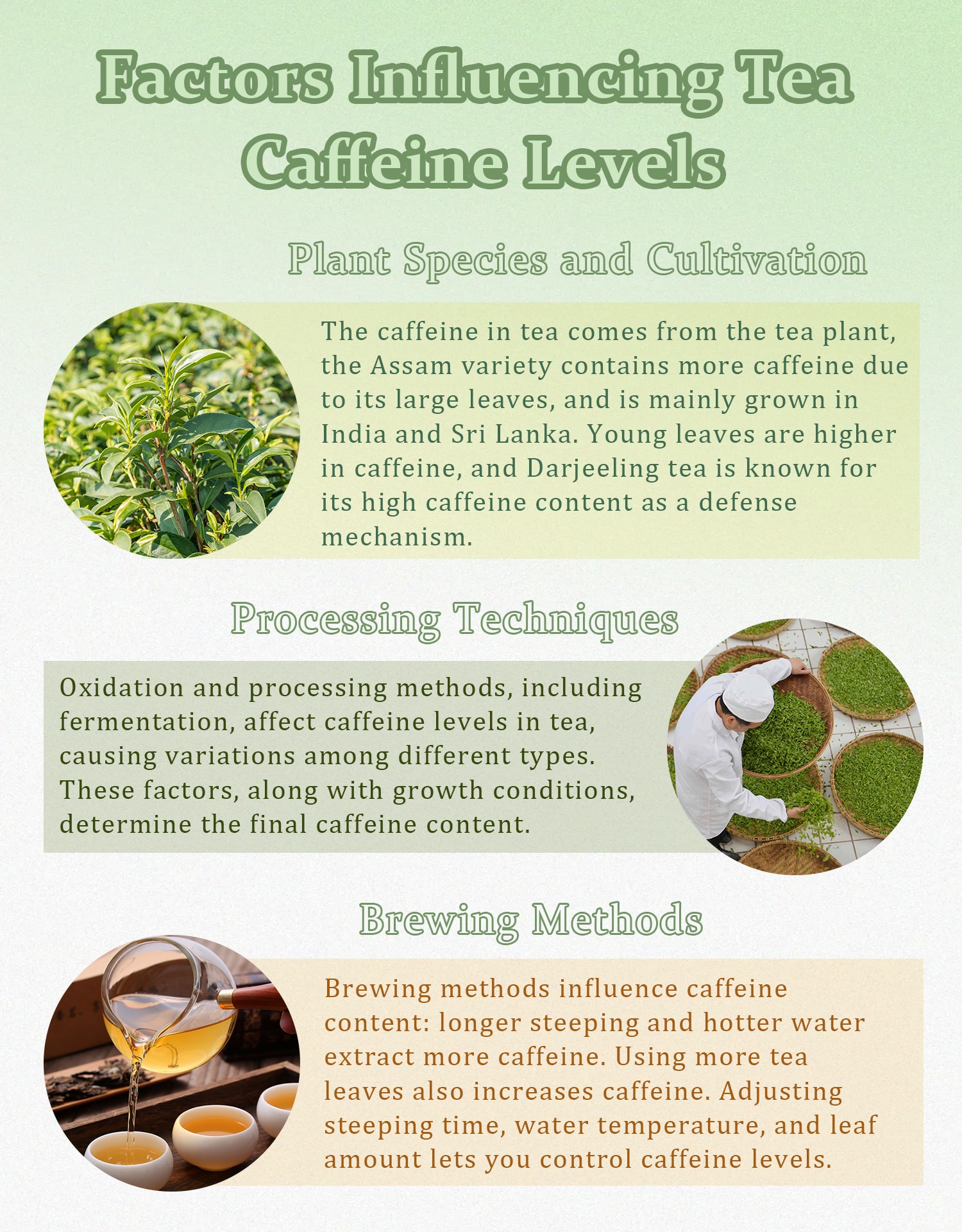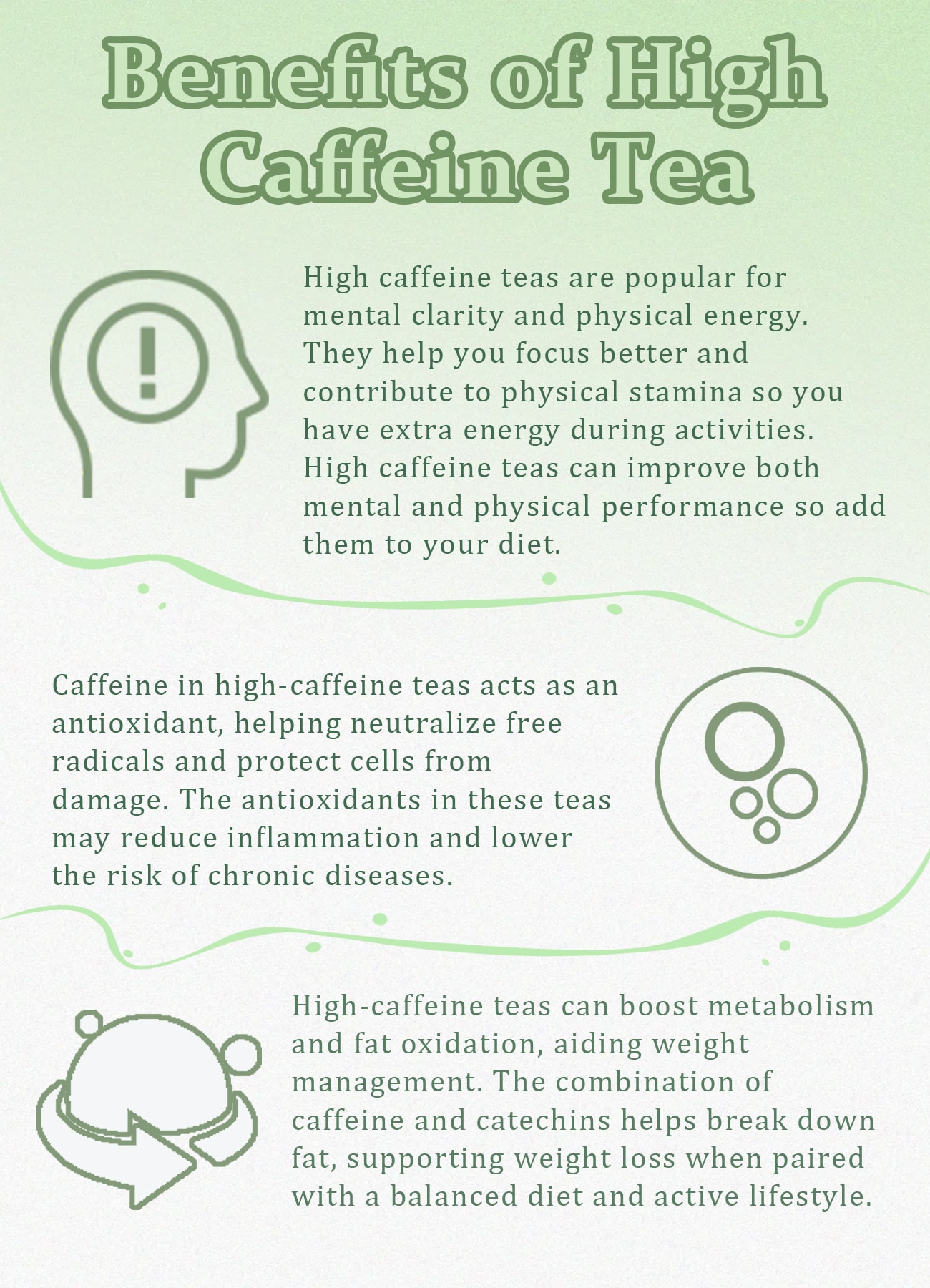
The Tea Highest in Caffeine: Discover the Best High-Caffeine Brews
liujiehangShare
Wondering which tea has the highest caffeine? This article covers the teas with the most caffeine content, such as Matcha and strong black teas, including those that are tea highest in caffeine. The exact caffeine content can fluctuate due to various factors such as the type of tea, brewing method, and steeping duration, making it complex to determine accurately. Find out what makes these teas the top choices for a caffeine boost.
- Matcha is the tea with the most caffeine, energy and health benefits come from whole leaf consumption and high antioxidant content.
- Black teas like Assam and Darjeeling have a robust flavor and high caffeine levels, great for long lasting alertness.
- Caffeine content in tea varies by type, processing and brewing method, so you can customize your caffeine intake to fit your needs.
- Many herbal teas are caffeine free, perfect for those who want to avoid caffeine.
Teas with the Most Caffeine
Not all teas are created equal when it comes to caffeinated teas. Some teas have more caffeine naturally, to give you that extra energy boost to start your day or power through the afternoon slump. Among them, Matcha and some black teas like Assam and Darjeeling stand out for their high caffeine content. These are naturally high caffeine teas, no jitters like coffee.
Oolong tea is another option to consider. Its caffeine content is between green and black tea, so a balanced choice for those who want moderate caffeine. Oolong tea is also good for you, weight loss and cholesterol reduction. The processing method of oolong tea affects its flavor and caffeine extraction, that’s why it’s unique.
Knowing the caffeine content in your tea allows you to choose the best brew for you. Here are the most caffeinated teas and what makes them special.
White teas are often misunderstood when it comes to caffeine content, they have less caffeine than black teas. But some white teas can have more caffeine depending on the preparation and the part of the plant used. That’s why white teas are an interesting option for those who want to manage their caffeine intake and still enjoy the flavor.

Matcha: The Caffeine King
Matcha has the highest caffeine content of all teas. From Japan, this powdered green tea packs a big caffeine punch because you’re consuming the whole tea leaf in powder form. This way you get the most caffeine and nutrients. Matcha is the go to for those who need a big energy boost.
Shading the tea plants for weeks before harvest increases Matcha’s caffeine and flavour. Consuming the whole tea leaf gives you more caffeine and antioxidants than regular green tea. Matcha is a powerhouse of goodness.
Adding Matcha to your daily routine will give you sustained energy without the crash. L-theanine in Matcha balances out the caffeine and gives you relaxed alertness and focus and mood.
Black Tea Varieties
Black teas, especially Assam and Darjeeling, are known for their strong flavor and high caffeine. An 8oz cup of tea has 25-60mg of caffeine, so if you need to stay alert all day, this is a good one. Unlike iced black tea which has the same amount of caffeine as hot, these varieties have a consistent caffeine kick.
Longer oxidation in black teas increases both flavor and caffeine. Whether you like the malty Assam or the floral Darjeeling, black teas are a satisfying and energizing experience.
Pu-Erh Tea: Aged and Energizing
Pu-Erh tea stands out not just for its unique aging process but also for its high caffeine content. Ripe Pu-Erh, in particular, offers an energizing boost that can rival other high-caffeine teas. As Pu-Erh tea ages, its flavor and caffeine levels evolve, providing a rich, complex taste that is deeply satisfying.
Pu-Erh is ideal for those seeking to explore unique flavors while enjoying high caffeine benefits.
Factors Influencing Tea Caffeine Levels
Caffeine levels in tea vary due to factors like tea type, processing methods, and brewing techniques. Knowing these elements helps you choose the right tea for your energy needs. Here are the key factors determining caffeine content in your tea.
The type of tea—black, green, white, or another variety—primarily determines caffeine levels. Regional cultivation practices, processing methods, and brewing techniques also play crucial roles. Understanding these influences helps you make informed decisions about your caffeine intake. For those looking to reduce caffeine intake, rooibos tea is a great caffeine-free alternative that offers health benefits such as protecting the liver from oxidative stress and potentially lowering blood pressure.

Plant Species and Cultivation
The Camellia sinensis plant is the primary source of caffeine in tea. The tea plant Camellia Assamica variety, with its larger leaf size, produces slightly more caffeine and is commonly cultivated in regions like India and Sri Lanka for its high caffeine content.
Younger tea leaves, found in tender shoots, contain higher caffeine levels compared to older leaves. Caffeine acts as a defense mechanism, increasing its concentration in younger leaves. Darjeeling tea, made from young Sinensis leaves, is known for its higher caffeine content.
Processing Techniques
Oxidation and processing methods affect caffeine content in tea. Oxidation in particular affects caffeine levels based on how the leaves are handled.
Fermentation methods also change caffeine levels and that’s why there are variations among tea types. These methods along with growth conditions determine the final caffeine content in your tea.
Brewing Methods
Brewing methods matter a lot. Longer steeping time and hotter water extracts more caffeine and gives you a stronger more caffeinated tea.
Amount of tea leaves used also affects caffeine content. More leaves means more caffeine. Adjust steeping time, water temperature and amount of leaves and you can control caffeine content to your liking.
Tea vs Coffee Caffeine Content
Caffeine levels in tea and coffee are very different so you can make an informed choice about how much caffeine you want to consume. An 8oz cup of brewed coffee has about 95mg of caffeine, most teas have 30-50mg. This means you can choose how much caffeine you want.
Coffee gives you a quick energy hit, tea releases caffeine slower so you get steadier energy. Tea is better for sustained energy without the quick spikes and crashes of coffee.
Tea vs Coffee Caffeine
A typical cup of brewed coffee has about 95mg of caffeine, black tea has about 47mg. Some teas like Matcha can have higher caffeine levels, sometimes similar to coffee. But caffeine levels can vary greatly even within the same tea variety.
Espresso has about 58mg of caffeine per shot. Now you can adjust your caffeine intake to your energy needs and preferences.
Effects on the Body
Tea’s caffeine is absorbed more slowly compared to coffee, providing steadier energy levels and avoiding rapid spikes. L-theanine in tea mitigates some stimulating effects of caffeine, promoting a relaxed state of alertness. This combination enhances cognitive performance and mental clarity without the jitteriness of coffee.
Caffeine is absorbed quickly, often within 20 minutes to an hour, stimulating the central nervous system and improving focus and alertness. High-caffeine teas like Matcha, containing both caffeine and L-theanine, provide a balanced boost in focus while minimizing stress.
High Caffeine Teas
High caffeine teas do more than just give you energy. They can boost cognitive function, alertness and overall physical performance. The unique compounds in tea like L-theanine help to calm down the effects of caffeine.
Adding these teas to your daily routine can give you health benefits from better mental clarity to better physical endurance. Here are the benefits.

Focus and Energy
High caffeine teas are popular for mental clarity and physical energy. They help you focus better and contribute to physical stamina so you have extra energy during activities.
High caffeine teas can improve both mental and physical performance so add them to your diet.
Antioxidant Properties
Caffeine in high-caffeine teas acts as an antioxidant, helping neutralize free radicals and protect cells from damage. The antioxidants in these teas may reduce inflammation and lower the risk of chronic diseases.
Weight Management and Metabolism
Certain high-caffeine teas can aid weight management by increasing metabolic rate and enhancing fat oxidation. The combination of caffeine and catechins elevates metabolic rates and assists in fat breakdown, potentially aiding weight loss efforts.
Adding these teas to a balanced diet and active lifestyle can effectively help achieve weight management goals.
Caffeine Balancing
Balancing your caffeine is key to enjoying high caffeine teas without the side effects. Tea has less caffeine than coffee so it’s better for those looking to cut down. But individual reactions to caffeine are huge so you need to know your limits.
Knowing the factors that affect caffeine levels and adjusting your intake accordingly will allow you to enjoy high caffeine teas according to your lifestyle. Here are some ways to balance your caffeine.
Know Your Limits
Knowing your limits is key to avoiding the negative effects. Signs of too much intake are headaches, insomnia and increased heart rate. Effects can happen even at low doses so knowing your tolerance is important.
Pay attention to these signs and adjust your caffeine intake to avoid issues.
Reducing Caffeine Sensitivity
Gradually decreasing caffeine intake may help lessen sensitivity and withdrawal symptoms. By slowly reducing your caffeine consumption, you can help your body adjust and decrease sensitivity, leading to fewer withdrawal symptoms.
This gradual approach can make the transition easier and more sustainable.
High-caffeine teas offer a unique and enjoyable way to stay energized and focused throughout the day. From Matcha to Pu-Erh, these teas provide a range of benefits, from enhanced cognitive function to aiding in weight management. Understanding the factors that influence caffeine levels, comparing tea to coffee, and knowing the best times to enjoy these teas can help you make informed choices about your caffeine consumption. By balancing your intake and recognizing your limits, you can enjoy the numerous health benefits of high-caffeine teas without the negative side effects. Many herbal teas are naturally caffeine-free, making them suitable for those looking to avoid caffeine.









